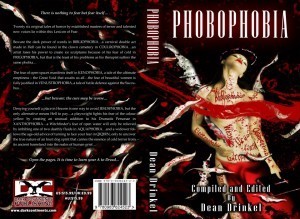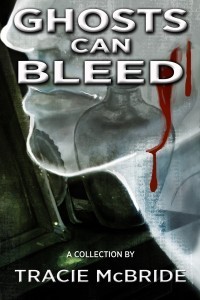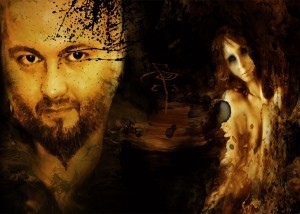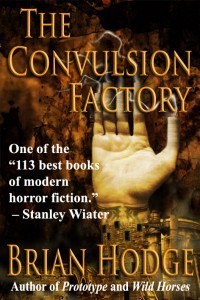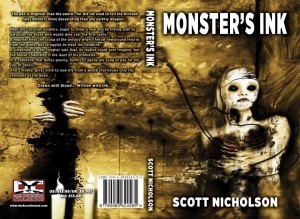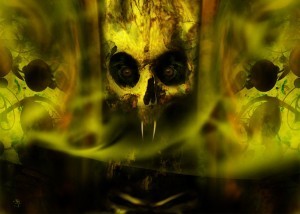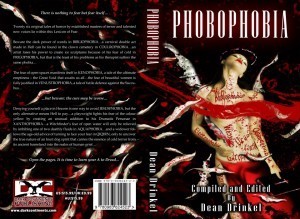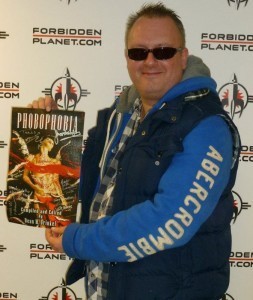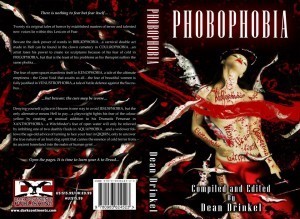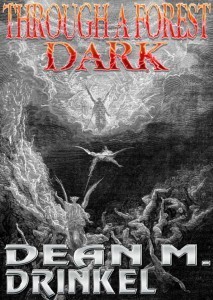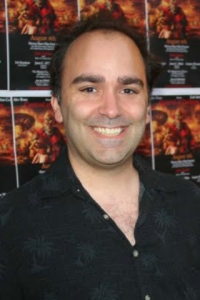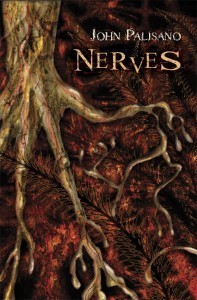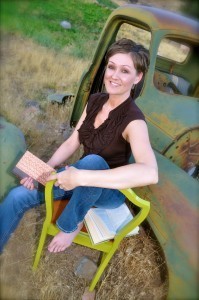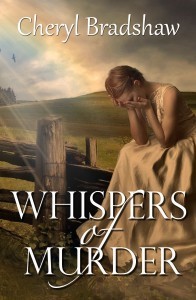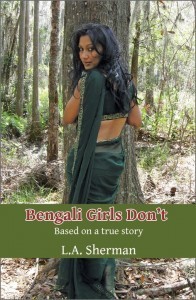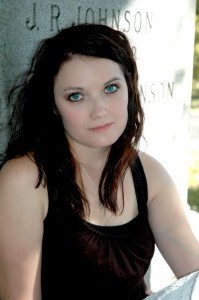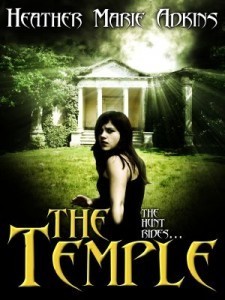G.R. Yeates's Blog, page 9
March 7, 2012
What do you fear? Wednesday with Tracie McBride
Today I would like to welcome Tracie McBride on What do you Fear? Wednesday to talk about her story, Hagiophobia, from the Phobophobia anthology released by Dark Continents Publishing.
1. You have cited a number of 'literary crushes' as having inspired you as a writer, such as Stephen King, Robert Heinlein, Margaret Atwood, Anne Rice and Clive Barker. Do you think it is important to have a broad range of influences in order to develop a mature 'voice'?
Absolutely. It's the one piece of advice given to writers that is universally true; for many reasons, one must read widely and voraciously to improve one's craft. I find it increasingly difficult these days to enjoy a story purely for the journey of imagination on which it takes me. Part of my brain is busily analysing and critiquing. I hear that people in other creative industries – movie makers and musicians, for example – have similar experiences. When I find an author whose work allows me to just trust, let go and enjoy it…well, it's like coming home. That's the most important thing I take from my 'crushes' and it's something I strive to achieve in my own work.
2. Your story in the Phobophobia anthology is about Hagiophobia – the fear of holy things. Why do you think there are so many phobias that relate back to fears of the religious and the spiritual?
Some might argue that organised religion is all about the fear; fear of transgression, fear of punishment, fear of burning in an everlasting Hell, or at the very least, fear of not being good enough to enter Heaven. Another interpretation of spirituality and religion is that it is the attempt of human minds to rationalise and come to know that which is essentially unknowable, which leads us right to the biggest fear of all: fear of the unknown.
I'm not a religious person, nor do I believe in Hell, but just the thought that it might exist scares the crap out of me. So I can see how someone who has been steeped in religion since birth, someone who does believe, might find that fear crippling.
3. I was impressed by the stark style of Hagiophobia, it makes the imagery used particularly hard-hitting, was the style a deliberate choice given the subject matter?
Not particularly. I can't claim to have a distinctive style yet, as I'm still learning my craft (and probably will continue to be learning until the day I die), but my work often tends towards a stark, spare style. Strunk and White say to "Omit Needless Words" and I have taken that advice very much to heart.
4. Your story in Phobophobia deals with familial abuse and bullying under the guise of religious obeisance – is this drawn from personal or observed experience?
I come from a secular family in which I am the oldest child; if it were drawn from personal experience, that would make me Clare. So no, it wasn't drawn from my life (or if it was, then I'm not admitting it). They say that your first idea is usually your worst, and the first thing that sprung to mind when I was asked to contribute to an anthology on phobias was the way that phobias usually seem to originate from traumatic events in one's childhood. Familial abuse is usually depicted as being inflicted by a father or father figure, sometimes a mother, occasionally an older brother, but not usually a sister. But I wanted to mess with the tropes a little.
I've drawn elements of the story from a couple of people I know. One friend in particular grew up in the church, moved away from it for a time in early adulthood, then returned to it. During that period of alienation, she did what Felix did at the end of my story, which when she first told me in a detached and matter-of-fact kind of way, made my jaw drop with shock. Her story had a much happier ending, though.
5. What do you fear? Tell me about your own phobias.
Big spiders. Deep water and the things that live in it. Bad things happening to my children. When we first moved to Australia, we went through a summer heat wave in a rented house with no air conditioning, and the temperatures reached 47C. Parts of the state literally spontaneously combusted, and people died, which gave me a mild fear of summer and an obsession with checking temperature gauges and weather forecasts.
6. Clare and Harmony are quite contrasting characters but both ultimately do control Felix in their own way – was this portrayal of a phobia's debilitating effect on an individual's self-control intentional?
Yes, it was, although you're being more charitable to Felix than I am. It's all about the women in Felix's life in this story – his girlfriend, his sister, his largely absent mother who he still feels a need to please, even his boss. Depending on how you look at it, poor Felix either never had a chance to find his own way in the world, or he's never tried.
7. Ambiguity and fatalism is more often seen in short horror fiction than in novel-length works? Why do you think that is? What makes us less willing to accept an 'unhappy' ending when it comes to novels?
We have more time to build up an empathy with the characters in a novel, so we're less inclined to let them go at the end. The short form allows for much more experimentation and dispensing with 'the formula' in general than a novel does, which is why I like it so much. For example, you can write a short story entirely in dialogue if you want, and if you do it well, it will work, but you'd be unlikely to get away with that in a novel-length piece.
Short horror fiction, in particular, thrives on ambiguity and fatalism. I love ambiguity in short fiction because it leaves me room to put my own interpretation on a story. And there's that maxim that the unseen monster is far scarier than the one that is fully revealed, which in a horror story can be used to great effect. That sense of inevitability is also used to great effect in horror fiction – it's like watching a car crash in slow motion, knowing what is about to happen, and being powerless to stop it (only it's a lot safer and saner to watch a metaphorical car crash on paper than an actual car crash in real life – same emotional response, only nobody gets hurt).
8. If the Phobophobia anthology were a series of songs – what genre of music would you say could best express the feelings that inform Hagiophobia?
Because I'm hopelessly mired in the eighties when it comes to music, I'm going to go with post-punk. Think the darker, moodier end of the spectrum, such as The Cure, Joy Division, and…dare I say it, The Church.
9. Tell me about one of the other stories in Phobophobia that you enjoyed and why.
Only one? That's a little tough, isn't it? Oh, alright, then… I don't want to come across as a sycophant, so I can't choose Pteronophobia. In that case, I'll go with K is for Kenophobia by Rakie Keig. I love a story with big themes, like this one that deals with wrongdoing, guilt and forgiveness. It's subtle and atmospheric, and Rakie builds the tension with a deft hand. It has something of the feel of The Sixth Sense about it, and not just because the protagonist sees dead people – that feel probably lies in The Big Reveal, which is shocking and totally unexpected, yet somehow when you look back over the story again, you can see the signs that were there all along.
10. So what does 2012 hold for Tracie McBride? Any last words?
I've promised myself that 2012 will be my Year of Change, and now that I've written it down here for others to witness, I'll have to stick with it. I have a second collection of short stories in progress, a follow up to my debut collection Ghosts Can Bleed released by Dark Continents Publishing in 2011. The new collection will be all previously unpublished originals and will represent my first foray into independent publishing. My other work-in-progress is my debut novel – and when I say "in progress", I mean it's currently gestating in my brain. All I'm willing to say about it at this stage is that it is about 21st century mermaids. Oh, and sex and blood and death.
Thank you, Tracie!
Phobophobia is available at the following links:
Ghosts Can Bleed is available for purchase at the following links:
If you want to find out more about Tracie, please visit the following linsk
Tweet
March 4, 2012
Sample Sunday: Hell's Teeth Preview III
Tom's eyes snapped open. There was a crash, it came again and again, a repeating thunderous report every few seconds. Sombre light was filtering through the torn cloth curtain, outside, booted feet tramped to and fro, dehydrated soldier shouts filled up the lulls between shellfall. He crawled out and got to his feet, Betty's charcoaled eyes watching him go, a wry smile on her fading lips.
It was as it had always been; dirt, the dead and the flies. The storm rains had softened the trenchworks, making them suck and squelch underfoot. The Turks were sending down whistling hails of plated death into the gullies of the trenches as usual, it would take more than shitty weather to make the enemy let up their assault. Ducking down, Tom wiped sleep from his eyes, blinking, scratching the teeming flies from his hair. He made his way to Brigade Staff HQ. Lieutenant Bell would be there, he would have orders that needed taking up to the batteries. Tom did not run, he walked, not caring to duck and cover as artillery fire roared down into the ground around him. He felt a disconnection in his gut, an umbilical severance from the reality of his surroundings, a separation he could not define in words. Shouts and screams pierced his eardrums, flecks of mud adhered to his unprotected face, the concussion of a distant explosion rocked the sun helmet loose from his head, he let it fall into the drying mud, Tom tasted the traces of rum in his mouth.
Yes, he thought, this is real and happening but it's not what it seems.
Lieutenant Bell was sheltering in the shade of his make-shift office. His head was bent over a dog-eared, yellowish map of the Front, he was scratching at it with the worn, flaking stump of a pencil, marking in changes of position, few that there were. Tom stood to attention and saluted upon entering, the Lieutenant did not look up, remaining hidden from clear sight.
"Potter, good to see you. We need a man to go over tonight."
The voice of the Lieutenant was wrong. It was coming from far away, a cavern somewhere. Tom could see it in his mind; a granite grotto with a skin of lichen, sea moss and tumorous coral growths, the grotto was a serpentine length extending back into a dismal cloud of gloom. Through the salt air, Lieutenant Bell's voice came out to him, a lasting echo, the voice of a man drowned, feeling his flesh creep at the notion of conversing with the dead, Tom stiffened even further to attention, resisting the electric shivers running through him.
"Over the top, sir?"
"Yes, later tonight. It's too dangerous now. The storm destroyed our communications. I need you to go out and do some telephone-wire laying. Connect Battery A back up to the Front."
"What time do I set off, sir?"
Tom kept it formal, he wanted to get out of here, out of this canvas morgue. Lieutenant Bell made to answer him but an asthmatic coughing fit wracked him, making him heave violently and grasp at his desk for support.
Tom saw the hand in the weak light, its nails cracking into blackened splinters, cuticles gummed over with gore whilst the knuckles were bare of skin and flesh, showing only bone, whitish nodules of barnacle were visible in the folds of clinging muscle cords. The thumb and forefinger were missing, torn away. The hand was snatched back into the gloom.
"You go out at three, Potter. Be ready. Dismissed."
Tom saluted and departed, wanting to run all the way back to his funkhole, he controlled himself, keeping his pace even. He caught the eyes of the men as he passed back down to the frontline, making his way through the crumbling rabbit warren. The eyes were not tired and bored as they should be, they were searching, seeing into him, knowing that he was of the living and not the dead. The silver-black flint in their hard eyes told him one thing, that the dead would not suffer him to live.
Hell's Teeth will be released in March 2012.
Copyright © G.R. Yeates 2012
Tweet
March 2, 2012
Phobia Friday: James Powell
For today's interview, I welcome the man behind the cover art of Phobophobia – James Powell!
1. Was there a particular artist or piece of work that originally inspired you?
When I was about 10-years-old I discovered Dungeons & Dragons, and Larry Elmore's work was the first art I remember really appreciating. Larry and I are now good friends, and just last summer we collaborated on a small sketch together, and it was just such a surreal experience. Bernie Wrightson stands out in my mind as a huge influence early on, especially his Frankenstein work. And I remember buying a copy of H.R. Giger's Necronomicon when I was about 17 and just not being able to put it down for weeks. A few years later I became friends with comic book artists Steven Butler and Mitch Byrd, and being exposed to their talents fueled a lot of my ambition to draw. Then, around '94, a friend introduced me to the works of Salvador Dali. His paintings were what inspired me to pick up a brush. At that point I knew what I wanted to be doing for the rest of my life.
2. Tell me about how you came to illustrate the cover for Phobophobia?
My good friend and author John Prescott was the Art Director for Dark Continents at the time. In early November, while I was working on another cover for Dark Continents, John called me up and told me to stop what I was doing, that there was a cover they needed yesterday. Well, it was Phobophobia. I told him I'd have it ready in two days. I think it took a total of about ten hours altogether to complete it.
3. Where did the concept come from for the cover image?
John gave me a brief description of what the image needed to be. I'd work awhile on it, then send it to him and he'd make suggestions here and there. John really pushed me forward on it, to make it better and better. I remember when the final design was finished, and all I kept saying to myself was, 'If only I had a few more days, it could be so much better!' And then everyone kinda went nuts over it like it was. Actually, I think I've done some of my best work under pressure!
4. What do you fear? Tell me about your own fears.
I fear for others more than I fear for myself. I'm not sure I have any specific fears. I know that over the past ten years there were two portraits I was asked to do that deeply disturbed me. They were relatively simple portraits, nothing really fantastic, nothing out of the ordinary. But each of these were of children who had died. There's just a morbid reality to that. And I think the most frightening stuff in the world is what we find in the history books and the newspapers! It's the guy down the street who has a monster in the cellar. The monster's hungry and it's telling Bill or Tom that it's going to eat him if he doesn't feed it. So, the little kids in the neighborhood start going missing one by one. And in the end, we discover that there's no monster in the cellar, just a bunch of dead kids. And Bill or Tom sat next to you in McDonald's the other day, and he seemed like the nicest guy in the world. That frightens me!
5. What do you think it is about fear that can inspire an artist?
When you have an imagination like mine, a flickering light bulb in an old house can inspire. Or the sound of a faucet dripping, or wind whistling through a cracked window. And when you combine those things all together it's creepy as hell. My mind conjures things from that. And I just call out whatever I think might be standing in the corner of the dark room and shed light on it. Then I show it to people.
6. You have a background in the music industry as well as being a poet and lyricist in addition to painting and drawing – how do you feel all of the disciplines you have been involved with compliment each other and shape your art overall?
Well, I rarely get bored! I don't particularly care for the term 'multi-talented'. If you're creative, and have a very vivid and active imagination, then you're going to use that. Whatever the outlet may be, you're going to plug in and create! The majority of my art is very dark, while most songs I've ever written were more of a positive nature. The relationship between the two is a kind of yin and yang. One thing I do find interesting, working in a computer program such as Photoshop, working in layers is the same as recording music. Every element added is like a music track. In music, every instrument plays it's part to create a whole song. It's the same with a piece of art.
7. You have experimented with a variety of techniques in your art – blending traditional methods with new ones created by developments in technology to stunning effect – how do you feel about the digital and its growing influence in the artistic sphere?
I remember how totally against digital I was. I hated the whole idea of it! Well, then I saw what Dave McKean was doing with it. It was like seeing the works of Dali all over again for the first time. I often get compared to Dave, and that's an honor, though I'd like to think I've found my own voice in the digital realm. I think it's helped a lot of people who didn't think they were artistic. I know people who said they couldn't draw a straight line, yet I've seen them create some very impressive stuff on computer. But above all, it's just like a pencil or a paintbrush, it's a tool, a means of getting that image that you see in your head out into the world.
8. What's the story behind the Grey People collaboration with Neil Gaiman?
I met Neil in 1992 at DragonCon in Atlanta. Back then, when I'd meet an artist I'd get them to draw me a sketch, and when I'd meet an actor I'd have them write me an original paragraph. Neil wrote 'Grey People' right off the top of his head. I tucked that little paragraph away for about seventeen years. In 2009 I was unemployed and desperate to get my art career going, and I got to thinking about that paragraph. As weird as it was, I felt I could illustrate it. So I sent Neil an email, told him my situation and what I had in mind, and asked for approval. I never for one minute expected a reply, yet I got one in less than five! His response was simple, 'Go for it!' It took me over a month to finish it, and I sent it to him and he simply said, 'That's lovely!' Then his agent contacted me and told me I had been placed on a list with other artist Neil might like to work with in the future. 'Grey People' opened so many doors for my career. I can't thank Neil enough for that! There'll come a day, when I'm ready, that I'll illustrate another paragraph that was written for me a few years ago by author Michael Moorcock.
9. You painted a number of guitars for famous musicians – were these original designs all your own or did the musicians have concepts that they gave you to work with?
It wasn't as glamorous as it sounds, but it was one of the most satisfying jobs I ever had. There was no real creativity involved, though there was a lot of discipline and technique. I was employed by Peavey Electronics in the late 90's. I stood in a metal box and sprayed guitars with paint all day. And every now and then there'd be that one guitar that would have that little tag on it that said E. V. Halen, S. Crowe, A. Lifeson, J. Entwhistle, as well as various others, and you knew who'd be playing those guitars. Ours was the main plant for the Peavey EVH Wolfgang guitars, each one a piece of art, worth thousands of dollars now. I love writing that into bios because technically it's true, I did paint guitars for these great musicians, but it's a joke compared to what I've done since then!
10. So what does 2012 hold for James Powell? Any last words?
I've just finished my eighth book cover, for Brian Hodge's re-release of 'Oasis'. It's the third I've done for Brian, and I've signed on for two more. Once those are done, he and I are going to release a signed, limited edition print set of those covers. I've been hard at work on a book collecting my art entitled 'Crossroads' that I'm hoping to have ready this summer. Brian's written a wonderful foreword for it. I've just been asked to do a portrait for one of my favorite actors, to be given to him on his birthday. I'm working on posters for an awesome horror film called 'Sick People'. There's a lot going on in my twisted head, tons of things I want to get started on and finish up!
Phobophobia is available at the following links:
'A pIeCE oF ARt iS NEveR FiNiSHed…OnLY ABanDoNEd!'
To find out more about James and his work, please visit these links:
http://greyhaven.weebly.com
facebook.com/artistjp
Tweet
February 29, 2012
"What do you fear?" Wednesday: Dean M. Drinkel
For the second interview in this series, please welcome Dean M. Drinkel – editor of Phobophobia as well as contributor and a director of stage and screen. Lights! camera! DEAN!
1. You have written poetry and prose, directed films and stage plays and now you are an editor of anthologies – do think having worked as a writer in so many mediums and roles has been beneficial to your growth as an artist?
For sure, it is interesting to me that I approach each of these mediums in a very different way – well, at least I think I do! I was having this conversation actually the other day with someone who works in a completely different industry and I said that (and sorry if this sounds pretentious) but it's like I use a different part of my brain depending on the medium or project I'm working on / in. I'm currently writing a film script set in France (actually about a writer as it happens) and I can almost feel myself think differently as I write it – it's a very clever script (even I do say so myself!) and I'll be pimping it in some way when I'm down in Cannes for the Film Festival in May. I wish I could say more but don't want to curse it.
What I also think is beneficial is if you have been asked / commissioned to do something that can then put a different pressure on you to create something great. Following on from PHOBOPHOBIA, I was asked to contribute to Dark Continent's new e-book series, Tales of Darkness and Dismay. I worked on something called THROUGH A FOREST DARK – four stories set in Paris, and I think because I was on a roll from PHOBOPHOBIA that I was able to put this together quite quickly. I'm very happy how it turned out – even if we took out a 'fifth' story due to its…controversial (sex / violence) subject matter. I hope that will see the light of day soon. I'm sure it'll be hunted down as Dean's 'missing story' in time. Hope so anyway – it certainly deserves it.
2. Your story in the Phobophobia anthology is about Zeusophobia – the fear of God. What was the original inspiration for this or were there a number of sources that you drew upon?
In some respects, this story was an unofficial follow up to the story that I did for John Prescott's M is for Monster. There will also be a third one which should see publication later in 2012 – I'm playing with ideas / characters as we speak. It's funny when I read some of my earlier work – God seems to play a big part but I'm not sure why. Reading the Monster and Phobophobia stories I could easily say that I'm angry with God – but I don't think I am, even though it is coming out in some of the stories I write. I must have issues. A friend once told me I had "authority issues" and as there is no higher authority than God well, perhaps they were right.
3. What do you fear? Tell me about your own phobias.
Recently I've faced one of my greatest phobias – and that is having a needle in my arm.
I haven't had one for a couple of years but had to have three on the same day. I was surprised that I couldn't even feel them – though the next day I was well and truly out of it, it was quite funny but I did wonder what I was getting all wound up about. What was amusing is the nurse that injected me, she must have hit a nerve or vein or whatever because she was suddenly covered in a jet of my blood….ah, it's the little things isn't it?
My second phobia is flying and whilst I was lucky to see quite a lot of the world at an early age, as I've gotten older I prefer to travel by train or boat. However, early March I have to go to Kenya for my little brother's wedding (hence the injections) and the only way I can get there is by aeroplane. It's something like a 11 hour flight so you can imagine what I'm going to be like. The last long haul flight I did was to New York a couple of years back and as soon as I landed, the first thing I did was go and have a stiff drink.
I have to be good on this trip though as my mother's going so no 'rocking and rolling' for Dean – also, I have a couple of projects I've got to finish editing / compiling. It's going to be a busy time for me…sitting at the pool….the sun shining….the drinks flowing….I'm sure you get the picture.
Anyway, there will be plenty of time for having it large when you, me and Jim Mcleod (Ginger Nuts of Horror) go out in a couple of months – now that will be messy.
4. Mysticism, God and Spirituality are key to horror writers such as Clive Barker, Arthur Machen, Matt Cardin and Mark Samuels – I would be interested in hearing your own thoughts on these subjects and why they attract you as a writer?
Let's get it out there for starters, I believe. Not sure in what form He / She / It exists but I'm pretty confident that there is something greater than us. I was born a Protestant, went to Catholic school for a while and lived in a Muslim country. I've always considered myself a Christian yet when I studied the Native American belief system as part of my degree there was something there which seemed to make sense – I wrote my thesis about the Salem Witches and I was convinced there was definitely some form of divinity involved in that helluva mess. When I look back at some of my earlier work, I think mysticism plays a big part though it's obvious that I'm reaching out, searching for different "Gods" – for example, a couple of those stories were based in Ireland or Scotland and deal with old gods / old religions – I was really into that at the time I seem to remember.
Clive Barker has been a massive influence and realistically why I do what I do. There was just something about his work which resonated with me. My story for MONSTER was compared to early Clive and in PHOBOPHOBIA I managed to utilise the talents of Female Cenobite Barbie Wilde – so I've been very happy about that. Also, from a directing point of view I directed a version of Clive's play Frankenstein in Love – the influence upon me is obvious. I have read some of Machen's work but will check out more of Cardin and Samuels' for sure – thanks for pointing me in that direction.
On those nights I can't sleep, I wonder: if I had the chance to touch God's face – would I? Would you?
5. Your work often portrays graphic and visceral body horror – what is it that interests you about showing the human forms in such extremes of distress? In Zeusophobia, there seems to be a link suggested between these states and a spiritual apotheosis.
I want my readers to be turned on – not so much by the sexual content but I remember when I read Barker's work as a late teenager and thinking "oh yes, this is what I want to write". Quite a lot of my characters are run through the mill and reach a point where they know they are about to expire but they also receive some kind of illumination (divine or otherwise) where suddenly they "get it".
As I'm writing this I'm thinking of two film references actually that have made an impact – bear with me on this: the first is Captain Kirk's death, it's just the look on Shatner's face when he's breathing his last and he says "Wow" or something similar and then also Richard Harris in "A Man Called Horse" – when the Native Americans torture him, hang him up and whilst he's in all that pain he goes through a spiritual enlightenment and he understands. I guess also the most obvious analogy to this would be Jesus – sorry, another religious reference….
…I quite like the idea also of peeling back the layers of what makes us us, you know what I mean? We wear many masques and I love the idea of playing with characters where there isn't anything more to reveal and its just the pure essence of what makes them them. I don't like the idea of re-incarnation at all – as far as I'm concerned I'm Dean and that's it – to think that I could have been John, Peter or Marigold at some stage is actually quite hideous. I'm sure there is a life after death, actually I'm pretty much convinced so all good on that front – see you on the other side!
6. In Zeusophobia, your portrayal of God is a confrontational one for the reader – do you think it can be more interesting to explore God as being a source of fear rather than the Devil as we are now overly familiar with the latter being cast as 'the bad guy'?
Don't you think we should fear God? I certainly do – I suspect he's mightily pissed off with what we've done to the planet he's created, if nothing else. But I think you're right, it is a little more interesting to explore God as the bad guy. God of the Old Testament is a very violent creature – smiting, killing, wiping out civilisations with nothing more than a click of His fingers – look what he wanted Abraham to do – sacrifice his own son in His name. In the New Testament he appears to have become the old man with a beard concept but from a creative point of view that's a bit boring. Conversely, I also like exploring Lucifer / Satan / The Devil a little more and at the moment I am sketching out a long form poem (to be accompanied by various illustrations) called Lucifer's Lament. That Devil is interesting because he wasn't always a red skinned, horned, bearded, hooved type of creature. Read of some the ancient texts and we're talking blonde haired, blue eyed and golden skinned – quite quite different and certainly no pitch-fork!
In popular culture, especially the movies, the Devil is always played by someone interesting – Al Pacino, Gabriel Byrne, Viggo Mortenson, Peter Stormare, Jack Nicholson but then who plays God? Morgan Freeman, Alanis Morrisette – not exactly the same is it. I'd love to write something that addresses the balance a bit – God can be bad can't He?
7. The structure of Zeusophobia is a series of very powerful vignettes that take us through the narrative using a different characters as the focus of each – what made you decide to use this structure when tradition tends to teach us to focus upon one character and their experiences? What do you like about the vignette as a form?
It wasn't planned actually but it's a form I'm really starting to dig. I've recently completed my story for the upcoming Titanic anthology I'm compiling / editing and it's fair to say I've had some fun again playing within that form. I think also, doing it that way I have been able to explore shorter stories within the short story form and whilst I appreciate some readers like to be "lost" within the story from start to finish, I believe my readers are intelligent enough to follow my stories even though there are severe shift changes in time, location, character etc.
I've recently written a film script where I follow the same idea – at first on the page it appears to be a collection of short scenes / films but quickly you realise it isn't. I love films that signpost their 'chapters' – The Sting is one and Woody Allen employed the technique in a couple of his early films. I like it.
Thinking about it, something you've now made me notice – in my film scripts whilst I do tend to use the vignette approach I do usually follow one character and their journey – however, in prose I don't…..you've got me thinking now – I don't need an analyst, do you come cheap?
8. If the Phobophobia anthology were a series of short plays – what style of theatre do you think would be most appropriate for Zeusophobia?
Love this one. Obviously Grand Guignol!!!!! I love that form of theatre. I've written a great piece called The Abattoir and I hope to get some cash together to direct / produce that – it'd be very visceral, violent have lots of nudity but boy it would be a blast for the audience. We'd have to issue macs and umbrellas due to the blood letting!!!! I'd love to do a version in English and then take it to Paris to do a French one with the same cast. You've actually planted a seed in my head – it would be fun to do a night of short plays based on Phobophobia wouldn't it? I've got my thinking cap on now (anyone reading this interview – please contact me if you're interested!!!).
9.
Tell me about one of the other stories in Phobophobia that you enjoyed and why.
It would be unfair to pick one story over another but I have to say, even though I'm not always a fan of the short stories, there are some great great tales in the antho. I really think Adrian Chamberlin's opener sets the bar high, quickly followed by Paul Kane – a story I really really enjoyed and wouldn't have looked out of place along early Clive Barker. Your story was the first one I read if I remember and I loved it – so much so we based the cover (by the bloody brilliant James Powell) on it!!!! Having Cenobite Barbie Wilde was a real coup too. If I take one thing from Phobophobia though it was the "find" of young French writer Emile-Louis Tomas Jouvet – his story was his first in English and boy, what a unique voice – definitely one to watch, so much so that he's contributed to another couple of anthos I'm got coming out and I'm looking to direct one of his short scripts.
10. So what does 2012 hold for Dean M. Drinkel? Any last words?
2012 is much of the same – of which I'm extremely happy. We have the Titanic antho for Dark Continents which I believe will be launched (in some description!) at Fantasycon; I also have Cities Of Death for Static Movement; there is also (if all goes to plan) a revision / upgrade / relaunch of my first collection The Burial later in the year and as I mentioned above Lucifer's Lament. I am dying to get behind the camera again – I have had a great script by Paul Kane called The Torturer for a little while, so that would be cool and something I've recently written called Stella Maris – and finally, two feature scripts – both based in France, and in French – that'd be a cool way to end the year, that's if we're all here past December 21st 2012!!!!!!
Thanks for the interview questions Greg – really enjoyed answering them for you. I've loved your writing for a while so it was great that you contributed to PHOBOPHOBIA and CITIES etc.
Can I just take this opportunity to thank everyone that was involved in PHOBOPHOBIA – it was a blast for sure and boy did we have a great signing at Forbidden Planet in December 2011!!!!! Also thank you to Barbie who got us some coverage in FANGORIA (Feb Edition) that was an honour to open it up and see my name amongst those hallowed pages – a dream come true for sure.
All I can say is, watch this space, there's lot more to come and for those of you that are about – come and say hi at the various BFS Events especially Fantasycon in Sept 2012, don't be afraid to buy me a drink and chew the cud!!!!
Thank you Dean!
Phobophobia is available at the following links:
Through a Forest Dark is available at the following links:
Please also check out the following links for news on Dean and his projects:
Tweet
February 26, 2012
Sample Sunday: Hell's Teeth Preview II
The world was tearing itself apart; the sky was burning, the earth beneath was shaking, the big guns spoke deafening thunder, pouring down a scorching shrapnel rain. Tom Potter ran through it all, a darting shadow, one amongst many that swarmed and multiplied in the dim, flickering trenches cut through the baked earth and stones of the Gallipoli peninsula. The British Generals must have been insane when they came up with this campaign. The beaches and the cliffs, that's all they had and it was all they ever had from the moment they splashed ashore. There was no shifting the Turks, they were tucked in cosy and tight, so much for the briefings that had gone on and on about the cowardly, undisciplined bandits they were going to rout with ease. Tom had seen nothing but evidence of sound tactics, good discipline and tenacity from the unseen enemy. The old men in charge of this fiasco seemed to have it in their heads that willpower and a vague sense of racial superiority were all that was needed to drive the other side from their positions.
Fucking ridiculous, he thought, this whole thing.
Not for the first time he wished himself far away from the blood, the heat, the dead and the flies.
Then the world tore apart again, the explosion punching him to the ground, driving the wind from his lungs in one go, curled foetal, he wheezed, gulping in great gasps of the burning acrid air. He patted himself down, shaking, steadily checking himself, arms, legs, head and torso and genitals. Lucky, he thought, as colours faded like momentary bruises from his retina, very fucking lucky. No pain, no wounds, no harm done, this time. Next time could be the last time. You never knew when or how, it was just a matter of waiting, minutes, hours, days and nights, wasting your life, waiting for death.
Tom got to his feet, blinking stinging sand from his eyes. His stomach lurching as hot wet flesh squelched underneath his boot making a bitter rush of bile spatter against the back of his throat. Up ahead was the crater where the machine gun burrow had been, the shell had gouged a great chunk out of the earthworks, throwing the Vickers gun high into the sky before it fell back down as so much twisted metal. Shredded sandbags covered the bodies of three gunners, inadequate funeral shrouds for what was left of them. The dead men were weeping bundles of bloody bits held together by tattered and torn uniforms. The life had been smashed out of them before they realised what was happening. Tom wondered if that was easier, better even, dying without knowing, having it over and done with in a moment. A glimmering caught his eye and he knelt down to see what it was. A severed finger, dirt caked in a black stripe under the cracked yellowish nail, the stump was horribly white bone and a plain band of dull metal encircled the digit, just below the knuckle. It was a wedding band.
No, Tom thought, this isn't better or easier, not at all.
Within the hour, the remains would become sticky nests; maggot factories incubating hundreds upon hundreds of black-headed bastards until they came bursting out as droning fly swarms. There was no chance of burial for these men because there was no time. It was the end of everything, the Gallipoli campaign was done, the evacuation order had been received.
At long last, they were pulling out.
Hell's Teeth will be released in March 2012.
Copyright © G.R. Yeates 2012
Tweet
February 24, 2012
Phobia Friday: John Palisano
Okay, today I am starting on a series of interviews with the authors who contributed to the Dark Continents anthology – Phobophobia, edited by Dean M. Drinkel, which includes 27 stories about all the things you fear the most!
First up for interview is John Palisano – former intern with Ridley Scott and rock musician turned horror scribe and he owes it all to that first viewing of Night of the Living Dead! They're coming to get you, John!
1.Like myself, you were involved in music before turning to writing – what do you think working as a musician taught you over the years that has been beneficial for you as a writer? What are some of the good and bad of writing prose and song lyrics?
Telling a story in a song is very challenging. You've only got a few verses, and you've really got to narrow things down to their very essence to get a point across. I still use that old songwriting tip: "Don't bore us: get to the chorus!" when writing. I attempt to write fast moving, fun stories. Who knows if they are, though? The bad part of writing song lyrics? That same simplicity you're trained to strive for in lyrics isn't always the best approach for writing. Sometimes you want to linger.
2. Your story in the Phobophobia anthology is about Osmophobia – the fear of smells. What was the original inspiration for this or were there a number of sources that you drew upon?
One of my favourite things about fiction is that you can address the other three senses not available in other mediums, like film, TV and the web. I thought it'd be neat to center a story around someone who could actually smell fear in his victims.
3. What do you fear? Tell me about your own phobias.
These day? Being alone! I used to crave being all by myself. Nowadays I can't stand it for too long. I need to be around people more often than not.
4. In the story, death and an obsession with it is one of the driving forces behind the narrative – is this an obsession you share or is this something you have observed in self-destructive individuals you have known?
Well, half and half. I'm not obsessed with death like the character in the story. I'm a very spiritual person, so for me, I feel I have answers that Scott was searching for. That being said: it's a very fascinating topic, isn't it? What does happen just as we die? Obviously it's something. I read that Steve Jobs's last words were, "Oh, wow. Oh, wow." What was he seeing? Now whether you believe it's just some chemical reaction in the brain that is releasing endorphins to calm you through it, or if you think it's a passing to an afterworld, there is most certainly something that happens to the human body at that precise moment. Very interesting.
5. I noticed the goth musicians and a scene that strongly reminded me of the lyrics to Metallica's One in the story – do you find that you take inspiration from lyrics, bands and music subcultures as much as literature?
That's a cool shout out to Metallica and 'One' – I'll have to re-read the story and see what you're referring to. I absolutely am inspired by music in my writing. There's usually a soundtrack in my head, or over my iTunes, while I write. I was even able to contribute to DARKNESS ON THE EDGE, an anthology that was all based on Bruce Springsteen songs. Now, I have to tell you that growing up, Bruce was my absolute favourite, so it was a huge honor to be in that book. My story was "Wings For Wheels", which was taken from a line in "Thunder Road". I riffed off that song and his whole Asbury Park world. It was great fun. I used to be married to a Jersey Girl, and we went down there, so I had a lot of visuals in my mind. Bruce's music is so romantic that it was hard turning it into a horror story, but I finally got there.
In my first novel NERVES, there is a character, Minnesota Flatts, who is an R&B singer on his way down. The brothers believe one of his songs may wake their mother from Ogam's curse. I actually created several songs, with lyrics, for the book. It was a real challenge. I'm a Rocker, so I had to listen to lots of 60s R & B to try and get the right flavour.
6. How are things going with your current band, Lemonball?
It's a blast. We're not in this to dominate MTV or the radio, but rather, to scratch that itch. There's a vey different feeling to this band than with any of my others. We've played with each other in alternate line-ups for ages, so this coming together has been very rewarding. Each of us sings, and we take turns leading the band. And our list of covers is enormous. One of us can start a riff from AC/DC or Zeppelin and we usually get through the whole song, no problem. We've got a couple of gigs coming up: we're playing a Girls' Roller Derby and we're playing at the Chivas Soccer Ball stadium in the fall.
7. If the Phobophobia anthology were a series of short films – what style of score do you think would suit Osmophobia?
I'd love to hear something industrial and modern, with electronic elements, mixed with organic sounds like hand drums and acoustic guitars.
8. Who would be your pick to play Scott out of the actors available today and would you direct it yourself?
Joseph Gordon-Levitt would be brilliant. I think he's really coming into his own as an actor. He's just tremendous—a very natural actor. I highly doubt I'd want to direct it myself. I'd prefer to see what some cinemaster would bring to the table. That would be amazing to see.
9. Tell me about one of the other stories in Phobophobia that you enjoyed and why.
Well, I think there were some stellar stories in the book. One that stood out was Kate Jonez's "E is for Electrophobia/Elmo's Light" because I thought her writing style was fantastic and the story pretty interesting and literary. I really liked the character of Elmo. Kate's a great writer, and one to keep your eye on. There were so many others, though! I hate just selecting one!
10. So what does 2012 hold for John Palisano? Any last words?
It's my biggest year yet, writing wise. First of all, my novel NERVES is just released from Bad Moon Books. The cover art by Gak is wonderful, and the layout by Cesar Puch is top notch. They also took the time to really copy-edit the book (shout out to Steve Sousa) and Roy and Liz just put out some amazing looking and reading books. Top notch stuff.
Besides the book, I've got some short stories coming out. One is in the Lovecraft E-Zine. There's an audio adaptation of my story "The Haven" from Horror Library 3, on Christopher Boyle's new Bizzarocast website. Who knows what else? The year is still young!
I'll leave it at this quote: "Always, always follow your instinct!"
Thank you, John!
Phobophobia is available at the following links:
To grab a copy of NERVES, please visit: www.BADMOONBOOKS.com
To learn more about John, and keep track of his many upcoming projects, please visit him at: www.johnpalisano.com and don't be shy! Say hello! Friend him on Facebook and Twitter!
Tweet
February 22, 2012
Writer Wednesday welcomes Cheryl Bradshaw!
Today I would like to welcome Cheryl Bradshaw to my website. Cheryl is the author of the Sloane Monroe mystery series and founder of Indie Writers Unite – the group to go to on Facebook if you are an Indie author starting out.
1. What was it that drew you to the mystery genre as a writer out of all others?
Agatha Christie. I'd read all of her books and was drawn in by Hercule Poirot and the way he figured out who the murderer was by the simplest of clues. I'd stay awake at night until two or three A.M. to finish her books. The more I read—the more I thought—hey, I can do this, too!
2. How much of yourself would you say goes into your protagonist, Sloane Monroe? And is her surname a reference to Marilyn -I noticed that you mentioned her in Indie Chicks- is there a story behind that if so?
Sloane is probably more like me than the other characters, but all the lead characters are extensions of me in some form or another. Even the ones that make my readers say ewww!
Sloane is my serious, unrelenting side—the never-give-up-I-don't-need-any-help side, and her sidekick Maddie is my fun and playful side. Even the serial killer in my last book is tied to me in some way. There's a part in Sinnerman where Sam talks about his childhood, and even though it was warped and far different than my own reality, some of the emotions he felt were ones I could connect with—it was easy peasy to write him, almost TOO easy. The more the series develops, the more readers will see a side of Sloane that makes her stand on her own and in a way that isn't much like me at all. This is prevalent and reveals itself in I Have a Secret.
As to Marilyn Monroe, I didn't use the last name as a type of homage to her (even though I went through a period of fascination with her in my 20's), but I did use the name Sloane from Ferris Bueller's Day Off. I pictured her looks much like that character, and I have always loved that name. It's strong and it's unique, just like Sloane herself.
3. And does Sloane have her own James Dean, or is it more complicated than that – as tends to be the way with private investigators?
Sloane is really good at screwing things up for herself, and I thought all her relationships would be complicated until I wrote Giovanni in at the end of Black Diamond Death. He was meant to be in that book only, but he wasn't satisfied with that, and far be it for me to argue with someone who might stuff me in the trunk of his car if he doesn't get his way. My readers have fallen for him, hard. I get fan mail for him like he's a real person. And I understand—sort of. He's dashing, sophisticated, and has enough money to woo any woman—but he doesn't need any of that. Who he is as a person grabbed Sloane and sucked her right in to his world. The problem is his world might put a target on her back with his enemies. That may play out in future novels in the series. And yes, I guess he is a form of James Dean in a way. Mysterious, intriguing, and irresistible.
4. As a writer who has also written a series, do you have an arc in mind for Sloane? Or are you more intuitive, letting the stories write themselves as they come without a set plan?
I am organized by nature, so I thought I needed a plan for Sloane and the series, but when I sat down to write it out, I had a hard time. It wasn't until I started typing without a timeline to work from that the story took shape and developed. When I sit down to write each day, I honestly don't know what's going to happen.
My mother-in-law said the funniest thing to me the other day. She said she didn't know what in the world I would do with Sloane next since she's already been in two novels. It made me think of other characters that have stood the test of time. All it takes is little imagination, after all.
5. You have said before that you are a private person so I would be interested in your point of view on how a writer can safeguard their privacy, if at all, when we are so much more exposed these days through Facebook, Twitter, Googleplus and so forth?
I read this book last year by Nadine Hays Pisani (Happier than a Billionaire) where she wrote about everything she went through over a one year period when she moved to Costa Rica with her husband—and I mean EVERYTHING. Even problems he had in the bathroom (and I'll just leave it at that). I hadn't laughed so hard in ages, and I kept thinking that I could never write something so honest and expose myself in that way, until I learned how freeing it was for her. It inspired me to start blogging about my own life and funny things that happen here and there—and my readers and fans go crazy for my silly posts. I am careful not to use my kids' names, and I don't post their pics and that type of thing.
My advice is to decide what level of privacy is important to you as a writer and protect it. If it's photos, change your website, blog, facebook so that you don't have a lot of personal photos on there that aren't meant for everyone to see. When I became an author, I revamped my blogs and my facebook page. I took most, if not all, of the photos of my kids off, and I only posted what I was comfortable with everyone seeing. I also don't friend everyone, and never friend fans—I send them to my author page. On Twitter, there are a few photos of me because that's where I'm looked at the most. I use that page to showcase myself as an author with my book covers, etc.
6. You founded the group, Indie Writers Unite, on Facebook of which I am a member. What was your thinking when you decided to do this and, with the group fast approaching 1,000 members, could you tell me how you feel about the group's success to date?
March 2012 will mark the one-year anniversary of Indie Writers Unite. I created it because, aside from a couple of famous author friends I knew who were legacy published, I didn't know much about the indie process. I had so many questions and wanted to meet other authors like me. I searched all over and wasn't satisfied with the groups I found, so I started my own.
I'm so proud of the group. It's grown more than I ever expected in such a short amount of time, and I've made many friends for life. In ways I feel like a mother bear protecting all her cubs from the sometimes harsh reality of indie publishing. My goal is to stand as an example, a support system, a cheerleader and whatever else anyone needs to foster their own journey. The group is one of the best things I've done in my life.
7. You also work as an editor and offer your services to other indie writers, with editing being one of the hot topics when it comes to criticism of indie writers I would be interested in what you have to say on the process – what do you think it takes to be a good editor?
To be a good editor it takes a good eye for detail, a strong background in English, a love of that type of work, and the willingness to fix errors that a freelance editor who's not in the industry would never notice. I had edited for ten years both inside and outside the novel industry before I started doing novels exclusively. To make sure I knew what I needed to look for, I read 2-3 books a week for a year on the industry, and learned everything from the taboo of using adverbs these days to the overuse of adjectives that should be replaced with power verbs. An ordinary editor wouldn't even see these things. They'd see sentence structure, grammar issues, words misspelled, etc. I wanted to go deeper than that. I wanted the novels I edited to all be best-seller list quality. This attention to detail has paid off for me. Last week I was contacted by a guy who travels the US speaking at writing seminars, and he has singled me out as an editor he will talk about at all of his conferences this year.
I do feel a lot of freelance editors hawk themselves to writers but don't have a strong enough grasp on the industry to catch the fine details in a novel that set a good novel apart from a great one.
8. Going back to your writing, I noticed that you have written poetry as well as prose – do you think a poetry collection might be something you would consider putting out there in the future? What do you enjoy about this form over writing prose?
I haven't written much poetry for years. Maybe one day I'll do that again. In high school and college I wrote poetry constantly. I entered contests and was included in a few different books that were published.
9. Are there other genres that you would like to write in or are you still finding there is lots left for you to explore in the Mystery genre?
The Mystery and Thriller genre is what I like the most. I write novellas in the Romantic Suspense genre, and I might, just might, write a witch series one day.
10. So what does 2012 hold for Cheryl Bradshaw? Any last words for the readers and the writers out there?
2012 will a big year for me with many goals in mind. I Have a Secret will be out at the end of March. That will be followed by the first annual Indie Writers Unite Cookbook hopefully in April. I'd like to put another novella out by May, and then have the fourth instalment of the Sloane series finished by the end of the year. That will make four in the series, and will make a nice boxed set. 
To the readers and writers I would say: What are your dreams? Are you achieving them? If you're not, why not today, and why not now? Time doesn't wait on us to decide we are finally going to turn that chapter in our lives that changes everything. Make every day count.
And last, thanks so much to you Greg for having me today.
Thank you Cheryl for being here. All the best!
Cheryl's books on Amazon:
Black Diamond Death (Sloane Monroe Series—Book One)
Sinnerman (Sloane Monroe Series—Book Two)
Whispers of Murder (A Novella)
To learn more about Cheryl, visit her here:
Tweet
February 19, 2012
Sample Sunday: Preview of Hell's Teeth
He could remember nothing more than bits and pieces; fragments, shards, shattered glass slivers and distortion, nothing whole, a prison of broken mirrors. Nothing was the way it should be.
It came out of the black rain.
Its chassis, loose and clattering; bubbled, wine-red paint peeling from its juddering hide, a heavy brown cancer of rust eating its way through the engine's grille and the spokes of the pneumatic wheels. Its windows were dim with dust, streaked with grime, and they rattled violently in their frames. The vehicle was an LGOC X-Type bus, only sixty of them were ever built to prowl the streets of London yet X61 was daubed onto the side of this one. There was no enclosed cab; the Driver sat in shadow beneath a small canopy, exposed to the elements, behind the engine, steering with deft, liver-spotted hands. His uniform clung to his shoulders and thorax, the material of it was stiff, hardened with a flaking crust, patches of ancient blood. He had no head with which to see but see he did, in his own way.
In the alcove towards the rear stood the Conductor; a Bell Punch machine hanging from cracked twin moons, the topmost buttons of his uniform. The metal of the antiquated device was dulled by age, leather-yellow fingers were stroking it with a lover's tenderness whilst a blind egg of glistening mortuary matter wore the conductor's cap. Pregnant sores were visible as a livid necklace around his throat, their discharge discolouring the unwashed china-blue collar of his shirt.
The Conductor cocked his head, catching a scent on the night air. He pulled a cord that hung above his head and a series of tinny chimes rang out inside the bus. The dried skin on the Driver's arms crackled as he turned left, following the Morse code instructions of his companion, depressing the accelerator. The Bus chugged, lurching forward as the engine sped up.
pokita-pokita-pokita
From the black hole of the Driver's neck fresh blood ran freely, displacing scabs that had grown over the puckered edges of the stump, torn veins and arteries were opening wide to disgorge a steady crimson flow as his fingers wound tight on the steering wheel. The Driver's open throat gurgled wetly, excited, as the Night Bus went on its way, seeking, that it might find.
He heard the engine first and then he saw it, in the moonlight, coming for him.
pokita-pokita-pokita
The sound of its machinery was old and tired, a dying animal preparing for one last lunge, a wounded soldier, bayonet in hand, about to impale an unwatchful foe. He backed away from its approach. The one working headlight of the Night Bus burst into life, catching him in its glare.
Run, rabbit, run, rabbit.
It bore down on him.
Run, run, run!
He turned and ran. His calf muscles clamping tight as he did, too old for this, whilst at his heels the Bus's rusty thunder grew louder and louder, an oncoming storm, the end of everything.
Hell's Teeth will be released in March 2012.
Copyright © G.R. Yeates 2012
Tweet
February 17, 2012
Follow Friday: Interview with L.A. Sherman
This Follow Friday I would like to welcome L.A. Sherman to my website. Her book Bengali Girls Don't is one of my favourite discoveries from the continuing ebook/self-publishing revolution; it documents her life growing up in Bradford, England before being forced into marriage as a child-bride in Bangaladesh, a harrowing existence which she eventually managed to escape from by winning the visa lottery and moving to America.
1. I'm interested as to what prompted you to sit down and write Bengali Girls Don't in the first place as it is a very intimate portrait of not only your own life but also your family and Bengali culture. I would imagine it's not something that came out of the blue but you reached a certain point in your life where it all needed to come out?
Actually, I wanted no part in writing it OR putting it out there for others to see. When I moved to Tampa, FL and met my husband-to-be (the guy I'm married to now), he kept saying (this is when he was initially learning about me, each day hearing bits and bats about my life), "Your life is soo interesting. No one's lived a life like yours before. It could be a movie!! It's so unique!" So when we decided to have a baby, because we had talked about what we'd do for the extra income when I wasn't working anymore, he said, "You should write your story. I'll help you. We'll make a million bucks!" Thank God we didn't know how much work it would be!
2. The opening section portrays the circumstances of your birth – was this written in collaboration with your family?
I called my mum on the phone one day and got the inside scoop. From that conversation I got 3 and a half pages of notes. Those notes were then used to write Part I of Bengali Girls Don't. Initially, Part I (the part about my birth during the liberation war in 1971) was longer, but after getting feedback from agents and other writers, I cut it in half. Snip, snip!
3. You interspersed the chapters with conversational sections where your thoughts and feelings at particular times are poured out – were these based on real conversations you have had or were they more internal dialogues designed to give the reader further insight into what you were going through? Personally I found them to be incredibly effective.
Thanks. They were indeed based on real conversations I had — conversations I had with my husband. He'd ask me questions about my life (this was usually at night or on our days off from work before we had the baby) and I'd respond, and the whole time we were taping ourselves with a digital recorder. We then typed the conversations up word for word — a few hundred pages in all, which I still have in a closet under the stairs — even leaving in the interjections, then used all that info as the basis for the book. The original first draft of the book was about 154,000 words. The final draft, the one now available on Amazon for purchase, was closer to 80,000. Lots of good stuff didn't even make it in.
4. Some parts of Bengali Girls Don't make for harrowing reading, such as the beatings you endured, and I'm interested as to whether you found them particularly difficult to write in terms of revisiting those feelings or was there more of a sense of liberation and catharsis involved in 'getting it out there'?
Not really. I was over it a long, long time ago. Honestly, as I was telling those parts to my hubby — and I remember him sitting on the edge of his seat, waiting for the words to drop from my mouth and into his eardrums— they came out more comedic on the tapes than harrowing, but when I put the manuscript together, I wrote it in the exact way that it happened, even using the emotions I felt at that time.
5. Reading about your enforced marriage I was reminded of Sylvia Plath's poem, Purdah, where she describes the constantly fluctuating mental state of a woman living in the shadow of her husband – was this something you thought was important to thoroughly describe to give the reader an understanding of the fear, rage and deprivation that someone in such a situation has to cope with alone?
Imagine living in England (that is, western society with all its amenities), and then being ripped away from all that, your friends, your familiar surroundings, your whole way of life and routine, and finding yourself in the middle of freaking nowhere, in another country that you've never even really lived in before, without a passport, in a land controlled by men, all alone and stranded without choices, except for the choices that are made for you, and then, all of a sudden, you find yourself getting married to a complete stranger even though you're in love with someone else who still lives in England, and on top of that you're mum is leaving you, abandoning you there and you're going to have to live with your mean ass uncle until the wedding day and take baths in ponds and sleep on dirt floors and constantly feel abandoned and unloved and always wondering "Will I ever go back to England, to my home? And what happens if my new husband can't get his visa? What will I ever do then? I'll be stuck here." It's just a hopeless feeling, I tell you. I knew a few girls my age who were in the same situation as I was. They came from England, too, and had to get married in Bangladesh like I did. It's just that I made it out because I won the visa lottery for America and they didn't. Some even died in childbirth.
6. You very adeptly mix Bengali phrases and references into the narrative – was this a conscious way of grounding the reader into the life that you lived? I thought it worked very well in terms of portraying how you were caught between two cultures.
It's just how I talk. I'm unique in that I'm fluent in Bengali, British-English (or should I say English-English) and American-English, and so whenever I write anything, you get three different flavours of speech. And yes, I did want the reader to know the most commonly used in a Bangladeshi household, just in case they ever visit one.
7. I'd be interested to know what you feel your beliefs are after everything you have experienced – do you still consider yourself a Muslim or have other belief systems crept in there and altered your perception of the world and beyond?
Well, I'm still a Muslim. That's what I was born as, so there's no escaping that. Like most people, I believe in God and pray and hope that one day I'll have a heart like Mother Teresa. Religion is a good thing, and so is having a relationship with God and trying to do the right thing, it's just that when you start mixing in your cultural beliefs with your religious beliefs then you run into trouble. A good example of that is female circumcision. The practice is not part of Islam but when people who practiced female circumcision a long time ago converted to Islam, they carried their pagan practices into the new religion with them.
8. Having lived in England, Bangladesh and America, how would you say you feel about your cultural identity now, do you still feel divided and 'caught' between them all or do you look upon yourself simply as an individual who has grown through the experience of these very different ways of life?
Still divided. LOL. In one sense, in America, you can live however you want, and you pretty much have the freedom to do anything you want. Believe me, I would have loved living in America when I was a teenager, going through everything that I was going through. I could have lived like Madonna! But now that I'm older, if I ever choose to live a more traditional life, you know where I wear a sari all day and do things in accordance with my religious beliefs and culture, and sincerely practice my faith, I believe it would definitely be a struggle. Back home, in England (and in Bangladesh, too, obviously), it would be easier because of the large Asian communities, but here, unless you're in NYC or Michigan, or other places where many Middle Eastern, Bengali, Pakistani, and Indian people live, you'd feel like Tom Hanks and his volleyball friend Wilson on an island: alone, scared, with no one else to talk to.
9. Tell me about how you managed to break into modelling in America? Judging from the photos in the back of Bengali Girls Don't you had a very eclectic career leading up to this.
It all started a few months before the book was set to be published and released to the world. I just happened to see an Egyptian themed photo-shoot event on Facebook and so I asked the host of the event if it was free to attend and how many pictures do the photographers take of you and do they give them to you right then and there on a disc or something and do they charge for their services? When the host of the event said yes, it's free and that the photographers usually give you the pictures right then and there on a disc or they'll email them to you later on and no, they don't usually charge money I was psyched! So I went, got some great pics, and the rest, as they say, is history… Although I'm slowing down a bit with the modelling thing now that I have a whole portfolio built, and I've been doing some music videos and even one movie (Tumbling The Movie), with one more Indie movie role coming in April.
10. So what does 2012 hold for L.A. Sherman and can you tell me more about your upcoming second book?
2012? Well, on December 21st, 2012, which is my hubby's birthday, the world is supposed to end, so anything I do I'll have to do before then, and do it big! J Currently, besides marketing, marketing, marketing (and did I mention marketing?) my book, Bengali Girls Don't, and trying to keep up with all this social media networking business, I'm working on a novel set in the UK (for the most part anyway), all taking place at Aldi, the grocery store. The writing is going good, it's just that so many other things have been getting in the way, and these other things have been preventing me from finishing it. Anyway, I'm working on changing all that so I can finish it and get it out there. It's called The Mourning of Karl Hankensten. And when people ask me what it's about, I usually tell them this: A guy on his way to the drugstore to buy pills in order to kill himself gets taken hostage by a terrorist. There's humour, tragedy, redemption and, of course, a killer ending. 
Thank you Luky!
BENGALI GIRLS DON'T is available at the following links:
Want to know more about L.A. Sherman? Follow the links below:
My website: Bengali Girls Don't
On Youtube
About the Author
L.A. Sherman grew up in Bradford, England in a strict Muslim family where she learned how to sneak out of the house without making the door creak. At the age of fifteen, she was tricked into going to Bangladesh by her parents and forced to marry a man as old as her father. After four years there with a wicked mother-in-law, she won the visa lottery for America and moved to the Big Apple. Now hard at work on her second book, she lives in Tampa, Florida with her family near a pond full of gators and spends her time doing all the things that Bengali girls don't.
You can see her speaking about her memoir behind the scenes at the "Grow" music video shoot; outside the Rising Sun music studio, and at the Bradenton Yacht Club in Palmetto, FL.
You can also see her in some music videos by clicking on the following links: Shebastian Burley's "I Know You See Me", Strizzo Feat. Javon Black's "Poke it Out", & Eric Feness Ceasar's "What You Drinkin".
Tweet
February 15, 2012
Writer Wednesday: Interview with Heather Marie Adkins
For this Writer Wednesday, I would like to welcome Heather Marie Adkins to my website to talk about how her beliefs inform her writing, the inspiration behind the strong female protagonists she creates and whether The House might be her first horror novel.
1. In your books, you write in great detail about spirituality so could you tell me more about how your beliefs guide your work, as I can see you are using these references to do much more than merely 'colour' the stories, they are integral to the characters and the situations they find themselves in?
This is an excellent question. To steal your word, the spirituality of my characters is integral to at least part of what I hope to accomplish as a Pagan writer. I think we're an underrepresented bunch—not so much that there aren't many Pagan authors because really, there are, almost as if Pagans and writing go hand-in-hand—but that not many choose to interlace their works with their spirituality. It can narrow one's audience, alienating those of other beliefs who are uncomfortable with alternative religions.
But the fact of the matter is that Paganism is deeply misunderstood, and even more so the idea of witchcraft. As a witch whose spiritual roots run deep, it's important to me to have characters that represent witchcraft the way it's MEANT to be. To teach people that the stereotype isn't always the case. Hollywood's green-skinned, warty-faced evil villain and pop culture's goth-girl in black lipstick and a bored expression are NOT what witchcraft is all about. Your average, every day witch is just like me—jeans, T-shirts, no make-up, but with maybe a borderline obsessive love for plants 
My spirituality is my everything. Second to none. I love everything about it, and that channels into my characters. When it comes to situations they find themselves in, well, they say write what you know. And I know witchcraft top to bottom; I've been on this path for ten years. When you have that kind of commitment, it tends to take over your brain. I write the kinds of books that I hope will speak to other Pagans, yet can also be enjoyed by anyone who just enjoys the paranormal.
One of the things I wish for as I continue my journey as an author is to represent witchcraft to people who don't know it.
2. In paranormal and dark fantasy fiction, strong female heroines have become something of a fixture, I would be interested to know how you approach creating characters such as Vale Avari in The Temple and make them stand out?
Vale was ridiculously easy to create. She's a lot of me—snarky, sarcastic, sardonic (that's a whole lotta S's.) She's incredibly loyal to those she loves, but leery of strangers. She's very opinionated, which is definitely one of my own downfalls, and she's strong. Because Vale draws so much of my own characteristics, I don't know that I can really answer this question! I've been told that all of my protagonists hold something of me in them—I guess the rest just flows from the ether. Or out of my a**, whichever comes first.
3. Do you consider your mom to have been an influence at all on any of your characters as I understand she is a police detective, a job which takes a great deal of inner strength?
I am so impressed by these questions.
I can't remember the EXACT quote, but there's a book by Liza Palmer called "Conversations with the Fat Girl", and in it she's says something like "My mother is, and always has been, my own personal concept of God." Something to that effect. When I read it, it hit me like a wrecking ball. My life has always revolved around my mother, simply because her life has always revolved around me. When I was a teenager, I hated it. But now, I realize how important it is to me for my mother to be central to my existence. She is a superhero to me; I'm so proud of all she's accomplished on the police department. In 21 years, she rose from a lowly street beat officer to a Major. That's only two positions down from Chief of Police. She's dedicated, hard-working, and intelligent, and she's also very, very strong. She raised me alone for sixteen years while working as a police officer, and if that doesn't take strength, I don't know what does. I am very much my mother's daughter in these respects.
Where am I going with this… Because my mom is such a huge part of my life, I guarantee she plays a big part in my books, if only because she has shaped the woman I am today.
4. In Underneath, you create an underworld city that reminded me very much in its atmosphere of the antarctic city from H.P. Lovecraft's At the Mountains of Madness so I am curious whether the horror genre has been an influence upon you at all and whether it is a genre you would think of writing in the future? The sacrificial scene was a particularly stand-out set-piece for me.
To be honest, I've not read much horror! Hell, I couldn't even come up with a single horror title I ever read (off the top of my head) in previous years. I recently read all of Jack Wallen's books—great horror in "Gothica". Not that I don't want to read more horror, just that it's not high on my infinitely, ever-growing to-read list.
So, no, definitely no influence from the horror genre. However, it is something I'd like to write, and I'm planning a sequel to "Underneath" that will be from Adara's POV five years later. It will be my first foray into a horror novel. Much of the city of Garneria from "Underneath" came from my extensive studies into the ancient Aztecs for a class—talk about a horror civilization.
5. I noticed you are currently rewriting a novel entitled The House which looks to me like your most sinister book to date. Can you tell me more about it?
Ah, I love this question. My family has been plagued by the paranormal from long before I was born. "The House" is based on the true story of my grandmother's childhood home. She lived on an old slave plantation in central Kentucky with her own grandparents and mother. Almost everything that happens in "The House"—from the blood stain on the floor that won't go away to the wailing from the slave's quarters—actually happened to my grandmother. I just turned it into a fiction novel  Come to think of it, it could probably be classified as horror.
Come to think of it, it could probably be classified as horror.
6. What do you think the benefits are as a writer imaginatively working in speculative genres as opposed to those which are more 'realistic'?
I can make stuff up! Full creative license. The Man can't bring me down. 'Nuff said.
7. In The Temple you make use of England as the setting so I'm interested as to whether you have visited this septic isle at all and your thoughts on the place? Any amusing anecdotes about the differences between Brits and Americans?
Unfortunately, no. I've yet to make it to England. I have, however, been to Ireland, which was the most amazing trip of my life.
8. I also notice that you have male characters who take on more nurturing roles as in Cause and Effect and Darren is the one who needs rescuing in Underneath – what are your thoughts on this refreshing kind of role reversal and switcharound in fiction?
You can't be raised by a female police officer without having strong feminist values. Too much of literature is steeped in "damsel in distress". Why's it always gotta be a girl in trouble? Boys can get in trouble, too, you know  I work for a police department. Trust me.
I work for a police department. Trust me.
I think the idea of the woman being the hero of the story is something every female can love. And it's something I think little girls need too—you're just as likely to be the hero as any boy.
9. The majority of my fiction to date has been inspired on some level by dreams and nightmares – I was wondering if your own have played an inspirational role in your work?
Oh, yes. The Temple came from a dream—it's actually in the book, at Chapter 10. The dream Vale has is the actual dream that gave me the idea for the book.
The same concept goes for several of my WIPs., but the other books I currently have out were just straight "ah-ha!" moments.
They say so many authors get their ideas from their dreams because we're much more open to the concepts of our imaginations when we're sleeping. It's that whole creative mind thing.
10. So what plans do you have for world domination in 2012? Any last words?
My plan for world domination in 2012 is less trying to market and more writing. I have 8 planned releases this year (and that's my low-end quote—I'd like to release at least ten). I'll also have one, if not two, co-written books with Julia Crane, as well as the short story anthologies of the Eclective. I want to focus entirely on pushing books out.
I'm also slowly building my formatting business in the hope I can leave my day job. We'll see what happens!
Thank you Heather!
Want find out more about Heather? Visit the following links:
The Temple is currently available at the following distributors:
Tweet


